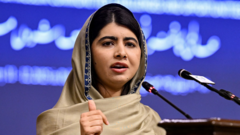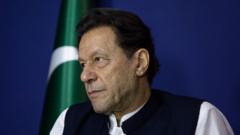Malala Yousafzai passionately criticized the Taliban's treatment of women during a conference in Pakistan, asserting that the group views women as less than human and calling for urgent action from Muslim leaders to improve the conditions for girls' education in Afghanistan.
Malala Yousafzai Calls for Action Against Taliban's Repression of Women

Malala Yousafzai Calls for Action Against Taliban's Repression of Women
At an international summit, Malala Yousafzai urges Muslim leaders to stand up against the Taliban's restrictive policies affecting women's rights and education in Afghanistan.
In a heartfelt address during a recent international summit on girls' education in Islamabad, Nobel Peace Prize laureate Malala Yousafzai urged Muslim leaders to actively oppose the Taliban government’s oppressive actions against women and girls in Afghanistan. Describing the Taliban as a regime that "does not see women as human beings," she highlighted the group's bans on female education and employment as fundamentally un-Islamic.
Malala, who survived a Taliban assassination attempt in 2012 for advocating girls' education, expressed her dismay over the prevailing "system of gender apartheid" established since the Taliban regained control in 2021. She emphasized the physical punishment and detainment faced by women who dare to defy the regime's restrictive laws, criticizing the Taliban for cloaking their oppression in cultural and religious pretexts that starkly diverge from the teachings of Islam.
Following her return to Pakistan, Malala shared her sentiments on the emotional weight of witnessing her homeland's struggles once more. Despite the inability of the Taliban to attend the summit, which featured numerous Muslim ministers and scholars advocating for girls' education, they have previously denied allegations of disregarding women's rights.
The international community continues to withhold formal recognition of the Taliban government, primarily due to its oppressive policies against women and girls. Currently, Afghanistan stands alone as the only nation where girls are prohibited from accessing secondary and higher education, a situation that has left about 1.5 million girls without schooling. Recent restrictions, including the barring of female midwives and nurses from training, further exacerbate this crisis.
Malala’s remarks didn't shy away from highlighting a broader crisis, noting that the rights to education for girls are under threat in several regions, including Gaza, Yemen, and Sudan. She called upon attendees at the summit to vocally oppose the grave violations against girls' education rights, asserting that inaction only serves to further undermine the future of countless young women worldwide.




















